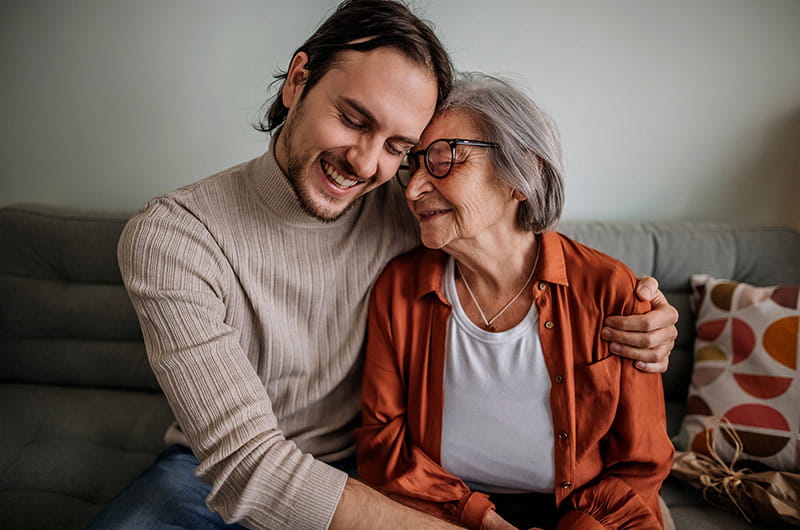The role of loved ones in the recovery of cardiac arrest survivors

When someone you love has survived a cardiac arrest, you might find yourself in a position where you need to help with treatment decisions, which can be overwhelming. It’s important to remember that you are not alone. Many people have been through this journey and are willing to share their experiences. Also, research shows that cardiac arrest survivors’ loved ones benefit from resources and support to help them through the process.
What is cardiac arrest?
Each year, more than 436,000 people in the U.S. die from cardiac arrest. According to the American Heart Association, cardiac arrest happens when the heart suddenly stops beating. Cardiac arrest can happen to someone whether they have been diagnosed with heart disease or not. It can also happen without warning or follow other symptoms. Without quick action, cardiac arrest is often fatal.
People who have a cardiac arrest outside of a hospital and survive often develop physical, cognitive and emotional challenges, some of which can last for months or years. In many cases, a family member or loved one must make medical decisions on their behalf due to temporary or permanent brain function loss.
According to Katie Dainty, Ph.D., a member of the American Heart Association CPR and ECC guidelines writing group and research chair in patient-centered outcomes at North York General Hospital in Toronto, Canada, the number of people who survive a sudden cardiac arrest is increasing because systems, processes and education surrounding emergency procedures and treatment for cardiac arrest have improved over the years. “While survival from cardiac arrest looks different for each patient, there are numerous decisions that must be made surrounding that person’s acute and long-term medical treatment, psycho-social needs and recovery,” she says. “In many ways, family members and surrogate decision-makers are ‘co-survivors’ of this life-altering event, and it is crucial that we turn our attention to understanding their evolving emotional, physical and informational needs as they navigate their new life and roles.”
Research backs surrogate decision-maker support
A pilot study from 2023 evaluated the effectiveness of the Tool to EMPOwer (TEMPO) Surrogate Decision Makers brochure in helping family members of comatose cardiac arrest survivors make informed medical decisions. Researchers enrolled 41 families and assessed their knowledge and confidence in decision-making before and after reviewing the pamphlet. Participants completed an eight-question knowledge questionnaire on the day of their loved one’s cardiac arrest and again 24 hours after reading the brochure. The results showed that caregiver knowledge improved and many participants felt more confident in making decisions about their loved one’s care.
The study found that 85% of participants considered the TEMPO pamphlet useful and 91% felt it made decision-making easier. Most participants (75%) were women, and racial/ethnic representation included 54% white, 22% Black and 24% Hispanic people. Nearly half (44%) of the surrogate decision-makers were spouses, while others were siblings (17%), adult children (17%) or parents (12%) of the patients. These findings suggest that providing structured, accessible information can support families navigating complex medical choices after a loved one’s cardiac arrest.
“Prior research has shown that families desire information about the event that their loved ones have just experienced,” says lead author Sarah Perman, M.D., M.S.C.E., an associate professor of emergency medicine at Yale University in New Haven, Conn. She explains that experts have identified supporting decision-makers for those recovering from cardiac arrest as a gap in medical care. Looking ahead, she says, researchers plan to run a larger trial of TEMPO that will build on this study and also look at the physical and emotional outcomes for both patients and decision-makers.
Another study from 2023 explored the psychological distress surrogate caregivers face and identified which resources were most helpful to them. The study involved 83 family members who acted as surrogate decision-makers for cardiac arrest patients. Each participant completed an assessment when the patient was discharged. The results showed that most participants had some form of psychological distress, with 66% reporting anxiety, 29% showing signs of post-traumatic stress disorder and 57% having moderate depression.
The study also investigated which interventions surrogates found most helpful in managing their distress. Participants were presented with eight potential interventions through a survey, four focusing on the patient’s recovery and four on the surrogate’s psychological well-being. The most highly prioritized intervention, chosen by 22% of participants, was “increased access to the care team,” followed closely by “increased information on potential recovery,” which was selected by 20%.
“Past research has proven that surrogates and other family members are highly afflicted by psychological stressors of their loved one being hospitalized, and our results showed an abnormal amount of our study group with psychological distress because of the event,” says lead study author Isabella Tincher, B.A., a research coordinator at Columbia University in New York City. “Recovery from an acute event is a traumatic experience that affects all that witness and aid in the recovery,” she says. “While it is important to focus on the recovery of the patient, the patient is ultimately discharged from the hospital, so it is important that we are taking a holistic approach through assessing the social drivers of health that may be impacting the patient and their family.”
As we continue to recognize the vital role family members play in the recovery process after cardiac arrest, it’s important to remember that support is available. With ongoing research and improved resources, surrogate decision-makers are gaining the knowledge and tools they need to navigate these difficult decisions. By focusing on both the patient and their caregivers, we can help ensure everyone involved has the support they need to heal and move forward together.





